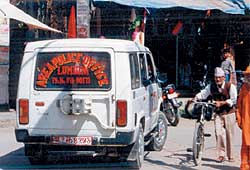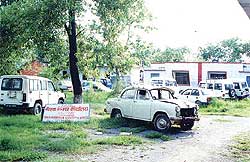 Centre for Investigative Journalism in late August last year an anti-smuggling patrol of the Royal Nepal Army impounded a truck with license plates Ba 1 Kha 6474 at Gallamandi, Bhairahawa. The papers showed that although the truck was a 1992 model, the customs duties due on it were paid 11 years ago, in 1987. A close examination revealed more: the trucks real license number was Ba 1 Kha 3538 but had been covered using Tipp-ex. The truck was, in actual fact, manufactured in 1999. Going by the papers, it entered Nepal a good 19 years before it was built.
Centre for Investigative Journalism in late August last year an anti-smuggling patrol of the Royal Nepal Army impounded a truck with license plates Ba 1 Kha 6474 at Gallamandi, Bhairahawa. The papers showed that although the truck was a 1992 model, the customs duties due on it were paid 11 years ago, in 1987. A close examination revealed more: the trucks real license number was Ba 1 Kha 3538 but had been covered using Tipp-ex. The truck was, in actual fact, manufactured in 1999. Going by the papers, it entered Nepal a good 19 years before it was built. This is not an isolated occurrence. Between early 2001 and early 2002 soldiers on revenue patrols have actually confiscated 45 vehicles and sent them to the Bhairahawa customs office. These include five full-sized trucks, 25 jeeps and passenger cars and 15 motorcycles. Likewise in the Krishnanagar customs area, 34 vehicles have been confiscated between August 2001 and February 2002-three trucks, 16 jeeps/cars and 15 motorcycles. What's more intriguing is that these vehicles were not impounded at the customs check posts as they were coming in from India. They were among the many actually operating around Nawalparasi and Kapilvastu for the past four or five years with "valid" papers issued by the Office of Transport Management.
And it is the ordinary, unsuspecting purchaser of vehicles locally that has become a victim of a racket that involves Nepali and Indian smugglers, police in Nepal, their political masters and government employees.
India has also begun to clamp down on car thefts. Police across the border have been extra vigilant after they started being inundated with daily reports of thefts. Early this year Indian police arrested 40 stolen vehicles headed for Nepal between Sunauli and Gorakhpur.
On 17 March last year Indian police impounded a blue Maruti car and sent its passengers Bhagawan Das, Chotelal Paswan, Samarlal Paswan and Bhagawati Kahari to prison. Police are on the lookout for the man who leads this mob, Kyamudin Khan. The four told police that they had smuggled eight stolen vehicles into Nepal before they were arrested.
Likewise two occupants of another Maruti car (UP 76 Y 6302) arrested last year in Kanpur while on their way to Nepal admitted that they had previously stolen, smuggled and sold seven vehicles. The leader of this group of car thieves, Munna Khan from Sonpipari, has been absconding to dodge an arrest warrant issued last year. Police say Khan could be hiding around Bhairahawa. "We are engaged in a campaign to bust car thieves and we need everyone to help," says Raja Srivastav, Superintendent of Police in Maharajgunj district of India's Uttar Pradesh state.
The Indian police is seeking similar support from its Nepali counterparts. This has come up in every meeting between officials from Nepal and India on controlling cross-border smuggling. Indian officials specifically requested the support of Nepal Police to stop cross-border crime at the meeting held at Bhairahawa early this year. The two sides agreed to exchange information on crime, including car thefts, and to act strongly against those involved in the business. At another meeting held in Gorakhpur on 2 May this year Nepali officials specifically asked Indian officials to arrest 28 Maoists and provided them with their pictures; the Indians wanted Nepal to help track down and arrest four car-smugglers who operate along the Nepal-India border. Among those named are Dayaram Yadav, Bhagawanpur's VDC, who runs his business from Bhairahawa and Sunil Kumar Pandit of Taulihawa.
 Most stolen vehicles sold in Nepal have been smuggled in by Dayaram Yadav. One of his former accomplices, Iswari Bhandari of Bhairahawa says, "The vehicles now impounded were registered in the names of his workers." An officer at the Office of Transport Management says most of the impounded vehicles were registered under the names Tulasi Ram Pandey, Bhawani Prasad Bhusal, Jumrati Musalman, Mahendra Yadav and Rishiram Kharel-all one-time employees of Dayaram Yadav.
Most stolen vehicles sold in Nepal have been smuggled in by Dayaram Yadav. One of his former accomplices, Iswari Bhandari of Bhairahawa says, "The vehicles now impounded were registered in the names of his workers." An officer at the Office of Transport Management says most of the impounded vehicles were registered under the names Tulasi Ram Pandey, Bhawani Prasad Bhusal, Jumrati Musalman, Mahendra Yadav and Rishiram Kharel-all one-time employees of Dayaram Yadav. On 29 August last year, the revenue patrol impounded a Tata Sumo from the house of Surya Dhoj Khand former Superintendent of Police, who have received a stolen vehicle while he was in the service in Bhairahawa. In another raid, they confiscated a jeep (license plate: Lu 1 Cha 1245) belonging to Birendra Kanaoudia, Minister of State, Water Resources. Even the Ilaka police office of Raneura uses a stolen vehicle with a license plate Ba 1 Jha 1975.
Employees of the Office of Transport Management are deep in the racket involving the falsification and issuance of fake licenses to stolen Indian cars. Bacche Raya, the head of the transport office in Butwal said evidence obtained from the impounded vehicles shows that there have been "weaknesses" in the past. He says, "We found 50 suspicious vehicles that had come for route permit renewals and ownership transfers in January and February."
Of the 42 vehicles impounded in Nepal, 26 were being used in the public transport sector. They had been purchased by the last owner after a few ownership transfers. The present owners had never suspected that vehicles could have been smuggled into Nepal. Khagiswara Thapa's jeep Lu 1 Pa 598 was confiscated sometime in late July. She says, "I did not know it was a stolen vehicle." Tears fill her eyes as she adds, "Now the army has taken the car to customs. I have lost my means of making an income."
Indian police imprison people arrested for stealing vehicles. In Nepal, because the vehicles have been transferred several times, even the police officials can't agree on procedure. "We know the smugglers have already transferred the vehicles many times, what is the point arresting people who purchased them unknowingly?" asks one.
Customs officials at Bhairahawa say that by selling the 79 vehicles impounded in Rupandehi and Kapilvastu as is, the government could earn up to Rs 30 million in revenues. But the Nepal Transport Operators Association does not think that is the right way to go, mainly because a majority of the vehicle are now the primary source of livelihood for the unsuspecting entrepreneurs who purchased them. Instead, the association says, the government should give the vehicles back to the owners after collecting a minimum duty. It is also demanding action against transport department employees who approved the first registration, as well as the person who sought it. A five-member special committee headed by Surendra Nath Aryal formed to investigate the issue submitted its report to government late last year. The Finance Ministry has still not decided what course of action to take.
The Nepal police has intensified its surveillance for stolen cars, but this, too, is hampered by political interference. The Rupandehi District Police impounded 12 vehicles in September-October last year, but was forced to let all of them go. Initially, Dayaram Yadav tried to coerce the police into releasing the vehicles. When he was unsuccessful, home minister Khum Bahadur Khadka intervened and made sure that police did as they were told. A number of policemen in Rupandehi say that the Superintendent of Police Kesha Bahadur Shahi was transferred from his post to Kathmandu because he refused to buckle under pressure from Yadav. Says a police officer in Rupandehi, "We had only just begun confiscating stolen cars. There was pressure from above, how can you work in such a situation?" Even today, "pressure from above" is the reason most policemen in the area will give when asked why they return impounded vehicles.
The car thieves have also changed their tactics and altered their routes, especially after Indian police began to clamp down on the racket across the border. A white Maruti was stopped and confiscated near the Ram Janaki temple in Sunauli on 10 September last year. The authorities discovered that the Indian license plate HR 65 K 6453 was fake. The people in possession of the car had borrowed papers belonging to an acquaintance, Mahesh Kumar Yadav of New Delhi, and changed the license plate. Similarly, another vehicle that was impounded across the border from Sunauli on early January was sporting a license plate taken off a motorcycle belonging to Anurag Agrawal of Gorakhpur.
The car-pushers also masquerade as journalists sometimes. The occupants of three Maruti vehicles on the road near Gorakhpur had produced identification cards showing that they worked at Manohar Bharati, an Indian Hindi weekly. On further investigations, the police discovered that they had more to do with stolen cars than newspapers, and that the vehicles they were driving had been stolen.
After the revenue patrols began picking out stolen cars, even transport operators have changed their routes. The vehicles plying the roads of Butwal, Kapilvastu and Nawalparasi have now begun servicing the dirt road to Gulmi, Baglung and Argakhanchi. "We have reports of suspect vehicles in Gulmi and Arghakhanchi," says Yagyamurti Bhandari, head of the western division of the Revenue Investigation Division, at Butwal. "We've been unable to go there because of lack of adequate resources and the general security situation."
"Things are not as easy as they used to be, even though police don't give us much trouble, the army is strict," says Mahendra Yadav, a trusted operative of Dayaram Yadav. "Many have already stopped the business." As for himself, he says he has begun taking on construction contracts and dealing in real estate, believing they are now more lucrative than the cross-border trade in stolen vehicles.
Meantime, Jagadamba Srivastav, who is charged with vehicle theft got a 20-year sentence at the appeals court in Butwal, in a separate case concerning the murder of a driver, Kallu Badai. The court decision came on 10 March and Srivastav has been on the run since. He had been charged with murdering the driver in 1994.
India is taking the car theft and illegal trade very seriously, and the National Crime Record Bureau, an agency under the Indian Home Ministry, is now involved in fighting it. Indian police officials say the Bureau will maintain updated computerised records of all vehicles registered in India, their chassis, engine and licence numbers, as well as information on the owners. The New Delhi Bureau will also set up branch offices in Raxaul in Bihar, Gorakhpur in Uttar Pradesh and other places where needed. "Once that happens, we will be able to make quicker arrests of car thieves and also recover stolen vehicles," says Bed Prakash Tripathi, of the Kolhoui police post across the border in India.


